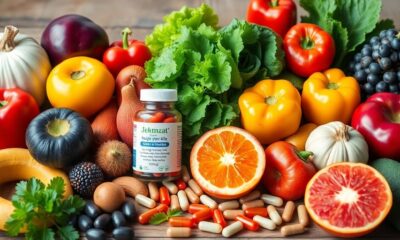Health & Fitness
Discover the Best Multivitamin for Women Over 40: A Comprehensive Guide to Optimal Health

As women enter their 40s, their bodies go through a variety of changes that can impact their health. This is a crucial time to pay attention to nutrition, as the right vitamins and minerals can help maintain energy levels, support hormonal balance, and prevent age-related health issues. Finding the best multivitamin for women over 40 can make a significant difference in overall well-being, making it essential to understand what to look for in a supplement.
Key Takeaways
- Women over 40 experience hormonal shifts and metabolic changes that require specialized nutrition.
- Key nutrients like antioxidants, B vitamins, and vitamin D are vital for maintaining health.
- When selecting a multivitamin, prioritize bioavailable ingredients and avoid unnecessary additives.
- It’s important to balance whole foods with supplements to ensure comprehensive nutrition.
- Consult with healthcare professionals to identify specific nutritional needs and deficiencies.
Why Women Over 40 Need Specialized Nutrition
After turning 40, a woman’s body goes through some significant changes. It’s not just about wrinkles; it’s about what’s happening on the inside. These changes mean that the nutritional needs of women in this age group are different than when they were younger. It’s a time when paying attention to what you eat and supplement becomes really important.
Understanding Hormonal Changes
As women enter their 40s, hormone levels, especially estrogen, start to fluctuate. This can lead to a whole host of symptoms, from mood swings to sleep disturbances. These hormonal shifts also affect how the body absorbs and uses nutrients. For example, lower estrogen levels can impact bone density, making calcium and vitamin D even more important. It’s like your body is changing the rules of the game, and you need to adjust your strategy.
Addressing Metabolic Decline
Let’s face it: our metabolism slows down as we age. This means we don’t burn calories as quickly as we used to, which can lead to weight gain. But it’s not just about the numbers on the scale. A slower metabolism also affects how our bodies process nutrients. We might need fewer calories overall, but we still need the same amount of vitamins and minerals, if not more, to keep everything running smoothly. Think of it like this: your engine is running at a lower RPM, but it still needs high-quality fuel to avoid sputtering. Making sure you get enough B vitamins is key for energy production.
Preventing Age-Related Health Issues
Unfortunately, the risk of certain health problems increases as we get older. Things like heart disease, osteoporosis, and certain types of cancer become more common. While diet alone can’t prevent these conditions, getting the right nutrients can play a big role in reducing your risk. For instance, adequate calcium and vitamin D intake can help protect against osteoporosis, while antioxidants can help fight off cell damage that can lead to cancer. It’s about building a strong foundation to support your health as you age. Eating a balanced diet and maintaining an active lifestyle are key strategies for cancer prevention.
Key Nutrients for Women Over 40
As women enter their 40s, their bodies change, and so do their nutritional needs. It’s not just about calories anymore; it’s about getting the right nutrients to support overall health and well-being. Let’s break down some key nutrients that should be on every woman’s radar.
Antioxidants for Aging Gracefully
Antioxidants are like the body’s defense squad, fighting off free radicals that can cause damage and accelerate aging. Think of them as tiny warriors protecting your cells. Here are a few important ones:
- Vitamin A (Beta-Carotene): Good for vision, skin, and immune function. Load up on carrots and sweet potatoes!
- Vitamin C (Ascorbic Acid): Boosts immunity, helps with wound healing, and keeps the brain sharp. Citrus fruits are your friend.
- Vitamin E (Tocopherol): Protects cells from damage and keeps skin healthy. Nuts and seeds are great sources.
B Vitamins for Energy and Brain Health
Feeling tired or foggy? B vitamins might be the answer. They’re crucial for energy production and keeping the brain running smoothly. The best multivitamin for women over 40 should include:
- Vitamin B6 (Pyridoxine): Supports brain health and helps turn food into energy. Chickpeas and bananas are good sources.
- Vitamin B12: Important for nerve function and making red blood cells. Absorption can decrease with age, so pay attention to this one. Fish, eggs, and dairy are good sources.
- Folate (Folic Acid): Supports DNA synthesis and red blood cell production. Leafy greens and legumes are excellent choices.
Vitamin D for Bone Strength
Vitamin D is essential for absorbing calcium, which is vital for strong bones. Women over 40 are at higher risk of osteoporosis, so getting enough vitamin D is crucial. Sunlight helps your body make vitamin D, but many people don’t get enough, especially during winter. Supplements are often necessary. Look for vitamin D3, which is the most bioavailable form. Fatty fish and fortified dairy products can also help.
Choosing the Best Multivitamin for Women Over 40
Okay, so you’re ready to pick a multivitamin? It can feel overwhelming, I know. There are a ton of options out there, all claiming to be the best. But don’t worry, I’m here to help you break it down. It’s all about knowing what to look for and what to avoid. Let’s get into it.
Comprehensive Nutritional Formula
You want a multivitamin that covers all the bases. Think of it as your nutritional safety net. Make sure it includes key nutrients like:
- Antioxidants (Vitamin C, Vitamin E, Selenium): These help fight off those pesky free radicals that contribute to aging.
- B Vitamins (B12, Folate, B6): Super important for energy levels and brain function. I’ve noticed a big difference since I started paying attention to my B vitamin intake.
- Vitamin D: Crucial for bone health, especially as we get older. Many of us are deficient, so this is a big one.
- Vitamin K: Often overlooked, but it plays a key role in bone and heart health.
Bioavailability of Ingredients
This is a fancy way of saying how well your body can actually absorb and use the nutrients. It’s not enough for a multivitamin to contain these vitamins and minerals; they need to be in a form your body can process. For example, look for methylcobalamin (B12) instead of cyanocobalamin, and vitamin D3 instead of D2. These forms are generally better absorbed. A liquid option over a capsule may be a better fit if you have gut malabsorption or swallowing issues.
Avoiding Unnecessary Additives
This is where things get tricky. You want a multivitamin that’s packed with the good stuff, but without all the junk. Here’s what to watch out for:
- Artificial Colors and Flavors: Totally unnecessary and can sometimes cause allergic reactions.
- Excessive Fillers: These add bulk but don’t provide any nutritional value. Look for a multivitamin with minimal fillers.
- Added Sugars: Some multivitamins, especially gummies, are loaded with sugar. Steer clear of those!
Ideally, you want a multivitamin that’s gluten-free, dairy-free, and soy-free. Certified non-GMO is a plus, and definitely avoid anything with artificial colors or synthetic fillers. I always check the ingredient list carefully before buying anything.
The Best Multivitamins for Women Over 40
It’s a jungle out there when you’re trying to find the right multivitamin. So many brands, so many promises! For women over 40, it gets even more complicated because our bodies are changing. Finding a multivitamin that addresses those specific needs is super important. Let’s break down some of the top contenders and what to look for.
Top Recommended Brands
Okay, let’s get into some names. There are a few brands that consistently get good reviews and seem to deliver on their promises. I’ve seen Pure Encapsulations O.N.E. Multivitamin pop up a lot – it’s a solid, vegetarian-friendly option. Metagenics PhytoMulti is another one to consider, especially if you’re watching your iron intake. And for those who hate swallowing pills, Quicksilver Scientific’s Ultra Vitamin (a liquid option) might be a lifesaver. It’s also great for those with malabsorption concerns. Remember, what works for one person might not work for another, so it’s all about finding the right fit for you.
Comparing Formulations
When you’re comparing multivitamins, don’t just look at the brand name. Check the ingredient list! Are you getting enough vitamin D3 for bone health? What about B vitamins for energy? And are the ingredients in forms that your body can actually use? For example, methylcobalamin is a more bioavailable form of B12. Also, pay attention to what’s not in there. Are there a bunch of artificial colors, flavors, or fillers? Ideally, you want something as clean as possible. Here’s a quick comparison table:
| Brand | Key Nutrients | Special Features |
|---|---|---|
| Pure Encapsulations | Vitamin D, B Vitamins, Antioxidants | Vegetarian-friendly, hypoallergenic |
| Metagenics | Vitamin K, Folate, Minerals | Iron-free option available |
| Quicksilver Scientific | Carotenoids, Vitamin E, Liquid Formulation | Good for malabsorption, easy to swallow |
User Reviews and Experiences
User reviews can be super helpful, but take them with a grain of salt. Everyone’s body is different, and what works wonders for one person might not do anything for another. That said, look for patterns. Are a lot of people saying they noticed a big boost in energy? Or that it helped with their joint pain? Or are there a lot of complaints about the taste or side effects? These can give you a better idea of what to expect. Don’t be afraid to dig around on forums and read what real people are saying about their experiences with different multivitamins. It’s all about doing your homework to find the best multivitamin for women over 40 that suits your needs.
Foods vs. Supplements: Striking the Right Balance

Okay, so we know that women over 40 have unique nutritional needs. But how do we actually get those nutrients? Is it all about popping pills, or is there a better way? Let’s talk about finding the sweet spot between food and supplements.
Prioritizing Whole Foods
Food should always be your first stop. Think of supplements as, well, supplements to a healthy diet, not replacements. I know, I know, it’s easier to grab a pill than to chop veggies, but trust me, your body will thank you. Whole foods give you a whole bunch of nutrients working together, plus fiber and other good stuff you just can’t get in a pill.
Here’s a quick reminder of some food groups to focus on:
- Fruits and Vegetables: Aim for a rainbow of colors! Each color group offers different vitamins and antioxidants.
- Lean Proteins: Chicken, fish, beans, lentils – these are essential for muscle maintenance and repair.
- Whole Grains: Brown rice, quinoa, oats – provide sustained energy and fiber.
Using Supplements Wisely
Alright, so you’re eating your fruits and veggies, but maybe you’re still falling short on certain nutrients. That’s where supplements come in. But it’s important to be smart about it. Don’t just grab the first bottle you see! Look for a premium multivitamin that’s specifically formulated for women over 40. Check the label to make sure it includes key nutrients like Vitamin D, B vitamins, and antioxidants. And pay attention to the dosage – more isn’t always better. In fact, too much of some vitamins can actually be harmful. Also, make sure that the multivitamin has undergone heavy metals testing to ensure quality.
Here are some things to keep in mind when choosing supplements:
- Read the Label: Know what you’re putting into your body. Look for recognizable ingredients and avoid unnecessary additives.
- Consider Bioavailability: Some forms of vitamins are easier for your body to absorb than others. For example, Vitamin D3 is generally better absorbed than Vitamin D2.
- Check for Third-Party Testing: This ensures that the supplement contains what it says it does and is free from contaminants.
Consulting Healthcare Professionals
This is a big one. Before you start popping a bunch of pills, talk to your doctor or a registered dietitian. They can help you figure out if you actually need supplements and, if so, which ones are right for you. They can also check for any potential interactions with medications you’re already taking. Don’t guess – get professional advice! Remember that modest reduction in cancer can be achieved with the right supplements, but only a professional can help you decide what works best for you.
Common Nutritional Deficiencies in Women Over 40
It’s pretty common for women over 40 to experience certain nutritional deficiencies. Life gets busy, diets aren’t always perfect, and our bodies change. Knowing what to look out for can really help you stay on top of your health. Addressing these deficiencies can significantly improve overall well-being.
Identifying Symptoms of Deficiency
Spotting a deficiency isn’t always easy, but there are some common signs to watch for. These can be subtle at first, but they can become more noticeable over time. Here are a few things to keep an eye on:
- Fatigue: Feeling tired all the time, even after enough sleep, can be a sign of low iron or B12. General fatigue is a common symptom.
- Brittle Nails and Hair: Deficiencies in biotin, iron, or zinc can show up in your nails and hair.
- Muscle Cramps: Low magnesium or potassium can lead to muscle cramps, especially at night.
- Mood Changes: Deficiencies in vitamin D or omega-3 fatty acids can affect your mood and contribute to feelings of sadness or anxiety.
Testing for Nutritional Gaps
If you suspect you might have a deficiency, getting tested is a smart move. There are several options available, and they can give you a clear picture of your nutrient levels. It’s also a good idea to track your symptoms to help identify potential issues. Here are some micronutrient testing options:
- NutrEval FMV by Genova
- Micronutrient test by SpectraCell
- Cellular Nutrition Assay by Cell Science Systems
Keep in mind that different tests can give slightly different results, so it’s best to stick with one test and track your results over time. This helps you see trends and make informed decisions about your diet and supplements. Testing is highly recommended to determine what individualized nutrient gaps exist.
Addressing Specific Needs
Once you know what you’re deficient in, you can take steps to address those specific needs. This might involve changing your diet, taking supplements, or both. Here are some key nutrients to focus on:
- Folate: Supports immune function and red blood cell formation.
- Magnesium: Involved in over 300 enzymatic reactions, including energy production and muscle function.
- B12: Essential for nerve and brain function, especially as absorption decreases with age.
It’s always a good idea to talk to your doctor or a registered dietitian before making any major changes to your diet or supplement routine. They can help you create a plan that’s tailored to your individual needs and health goals.
Lifestyle Factors Impacting Nutritional Needs
It’s easy to think about multivitamins as a simple fix, but the truth is, what you do every day has a HUGE impact on what your body actually needs. It’s not just about popping a pill; it’s about how you live your life. Let’s get into it.
The Role of Physical Activity
Okay, so you’re hitting the gym, or maybe just chasing after the kids all day – either way, you’re moving. That’s great! But all that activity burns through nutrients faster. The more active you are, the more your body needs to repair and rebuild. Think of it like this: a car that’s constantly on the road needs more frequent oil changes. Your body is the same. You might need more protein, more electrolytes, and definitely more antioxidants to combat the stress on your cells. It’s not just about calories; it’s about the quality of those calories and the micronutrients that support your activity level. For example, someone who runs regularly might need more magnesium than someone who is sedentary. You can check your magnesium levels to make sure you are getting enough.
Stress Management and Nutrition
Stress is a killer, plain and simple. When you’re stressed, your body goes into fight-or-flight mode, which uses up a ton of resources. And guess what? That includes vitamins and minerals. Chronic stress can deplete your body of B vitamins, vitamin C, and magnesium, among other things. Plus, when you’re stressed, you’re more likely to reach for junk food, skip meals, or just not eat as well as you should. It’s a vicious cycle. So, managing stress isn’t just good for your mental health; it’s crucial for your nutritional health too. Consider incorporating stress-reducing activities like yoga, meditation, or even just taking a few minutes each day to breathe deeply. It can make a bigger difference than you think. You can also try to improve your sleep quality to reduce stress.
Sleep Quality and Its Effects
Speaking of stress, let’s talk about sleep. Or, more accurately, lack of sleep. When you don’t get enough sleep, your body produces more cortisol, the stress hormone. This can lead to a whole host of problems, including increased inflammation, impaired immune function, and, you guessed it, nutrient deficiencies. Plus, poor sleep can mess with your appetite hormones, making you crave sugary and processed foods. Aim for 7-9 hours of quality sleep each night. Create a relaxing bedtime routine, make sure your bedroom is dark and quiet, and avoid screens before bed. Your body (and your multivitamin) will thank you for it. If you are having trouble sleeping, you can try stress management techniques.
Final Thoughts on Choosing the Right Multivitamin
In conclusion, picking the right multivitamin for women over 40 can really make a difference in your health. As we age, our bodies need different nutrients, and a good multivitamin can help fill those gaps. Remember, it’s not just about popping a pill; it’s about supporting your overall well-being. Focus on a balanced diet, and use supplements to boost your nutrition where needed. Always check with a healthcare professional before starting any new vitamins. With the right approach, you can feel your best and tackle whatever life throws your way.
Frequently Asked Questions
Why do women over 40 need special vitamins?
As women age, their bodies go through changes that affect their health. After 40, they may experience hormonal shifts, a slower metabolism, and a higher chance of health issues like osteoporosis. Special vitamins can help support their changing needs.
What key nutrients should women over 40 look for?
Women over 40 should focus on nutrients like antioxidants (vitamins A, C, E), B vitamins for energy, vitamin D for strong bones, and vitamin K for heart health. These help keep energy levels up and support overall well-being.
How do I choose the right multivitamin?
When picking a multivitamin, look for one that has a complete mix of vitamins and minerals, is easy for the body to absorb, and doesn’t have unnecessary fillers or additives. It’s best to choose one made for women over 40.
Are there good multivitamin brands for women over 40?
Yes! Some popular multivitamin brands for women over 40 include Pure Encapsulations, Metagenics, and Quicksilver. Each offers different formulas to meet specific health needs.
Is it better to get nutrients from food or supplements?
Whole foods should be the main source of nutrients, but supplements can help fill in gaps, especially if you have dietary restrictions. It’s important to balance both for the best health.
How can I tell if I’m lacking certain nutrients?
Common signs of nutrient deficiencies include fatigue, mood changes, and difficulty concentrating. You can also ask your doctor about tests to check your nutrient levels for a clearer picture.
-

 Home and Garden2 days ago
Home and Garden2 days agoTransform Your Space: A Guide to Minimalist House Interior Design in 2025
-

 Home & Family3 days ago
Home & Family3 days ago10 Essential Cleaning Hacks for Bathroom Surfaces You Need to Try
-

 Press Release6 days ago
Press Release6 days agoWhat Makes Alaxio Different from Every Other Altcoin?
-

 Innovations5 days ago
Innovations5 days agoWill AI Take Your Job? The Truth About Automation and Employment
-

 Crime3 days ago
Crime3 days agoExploring the Most Anticipated New True Crime Documentaries of 2025
-

 Health & Fitness3 days ago
Health & Fitness3 days agoDiscovering the Best Multivitamin for Women Over 40: Essential Nutrients for Optimal Health
-

 Business3 days ago
Business3 days agoMaximize Your Earnings with American Express High Yield Savings Accounts in 2025
-

 Business7 days ago
Business7 days agoS&P 500 Extends Winning Streak Despite Moody’s Downgrade


















